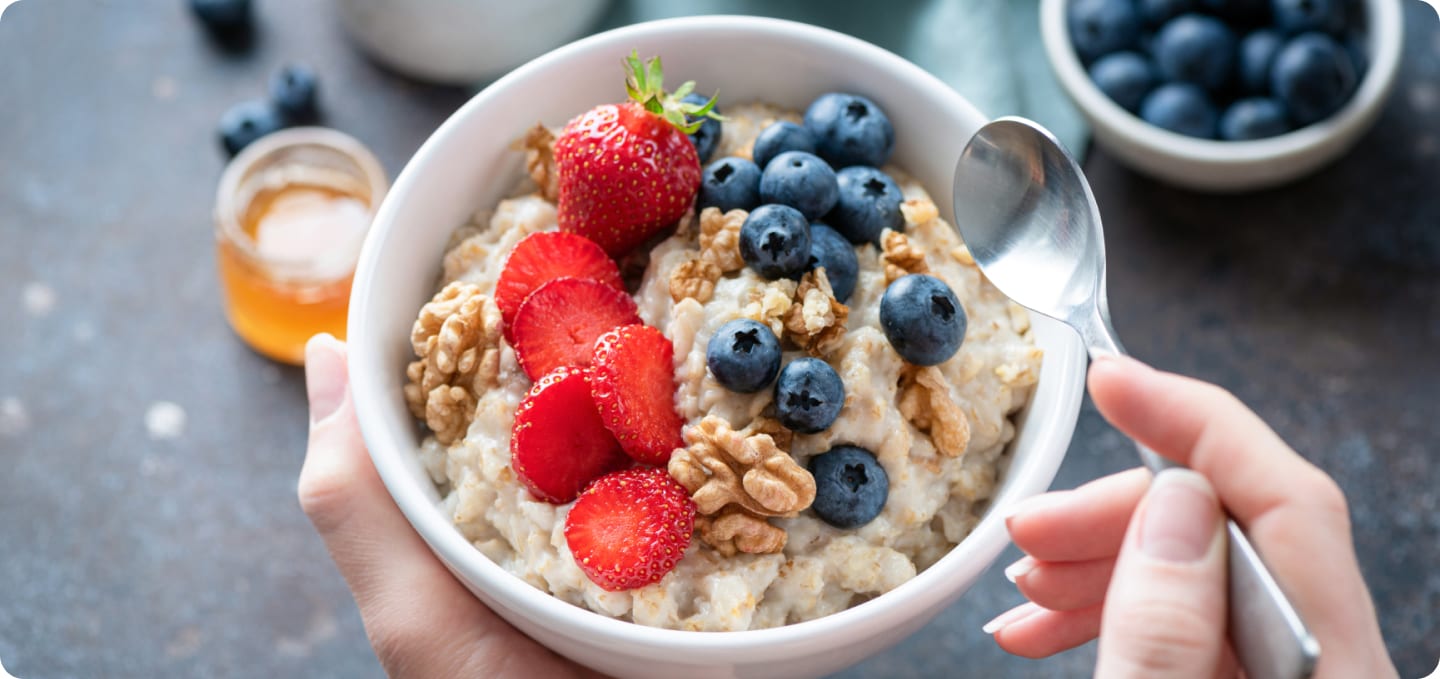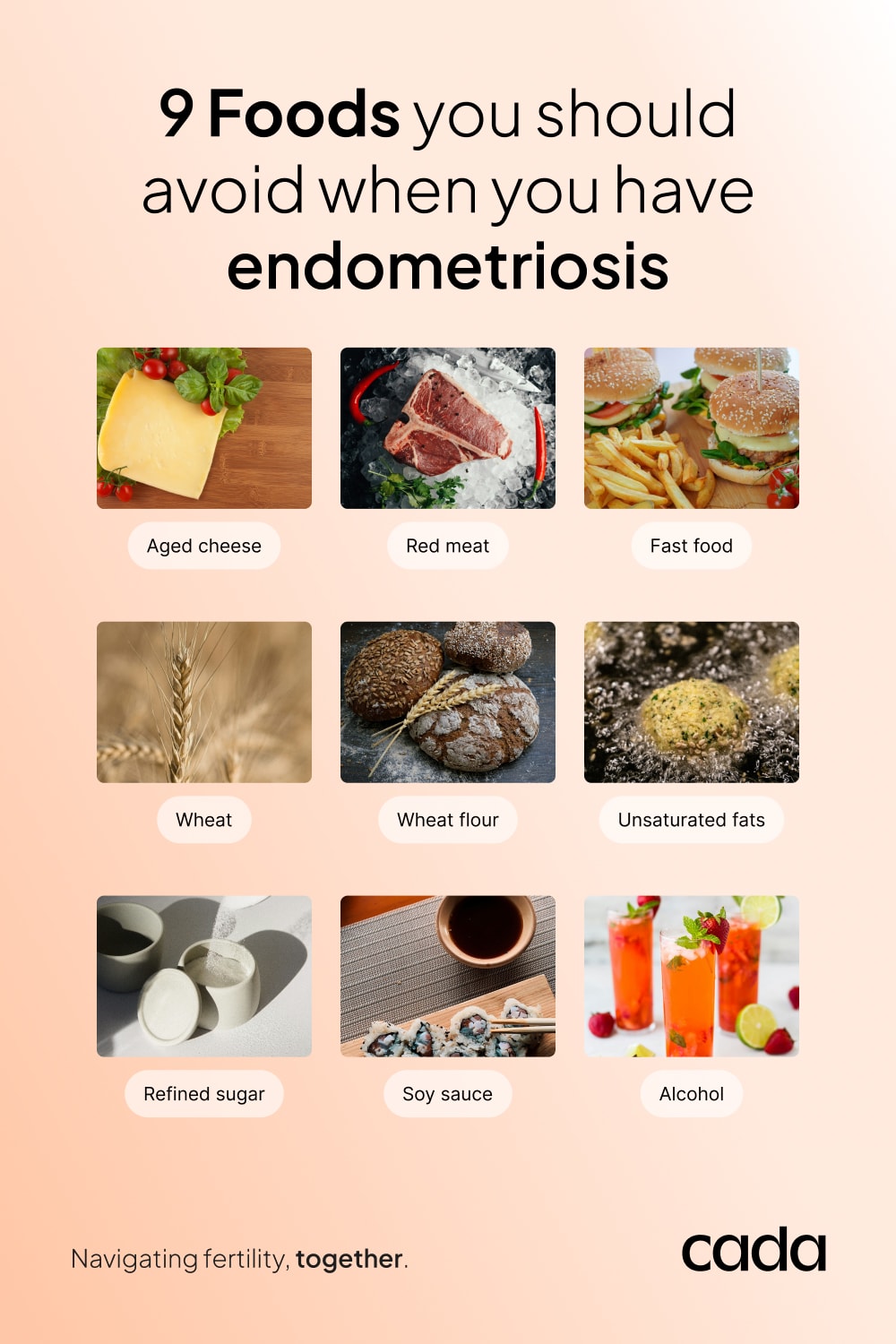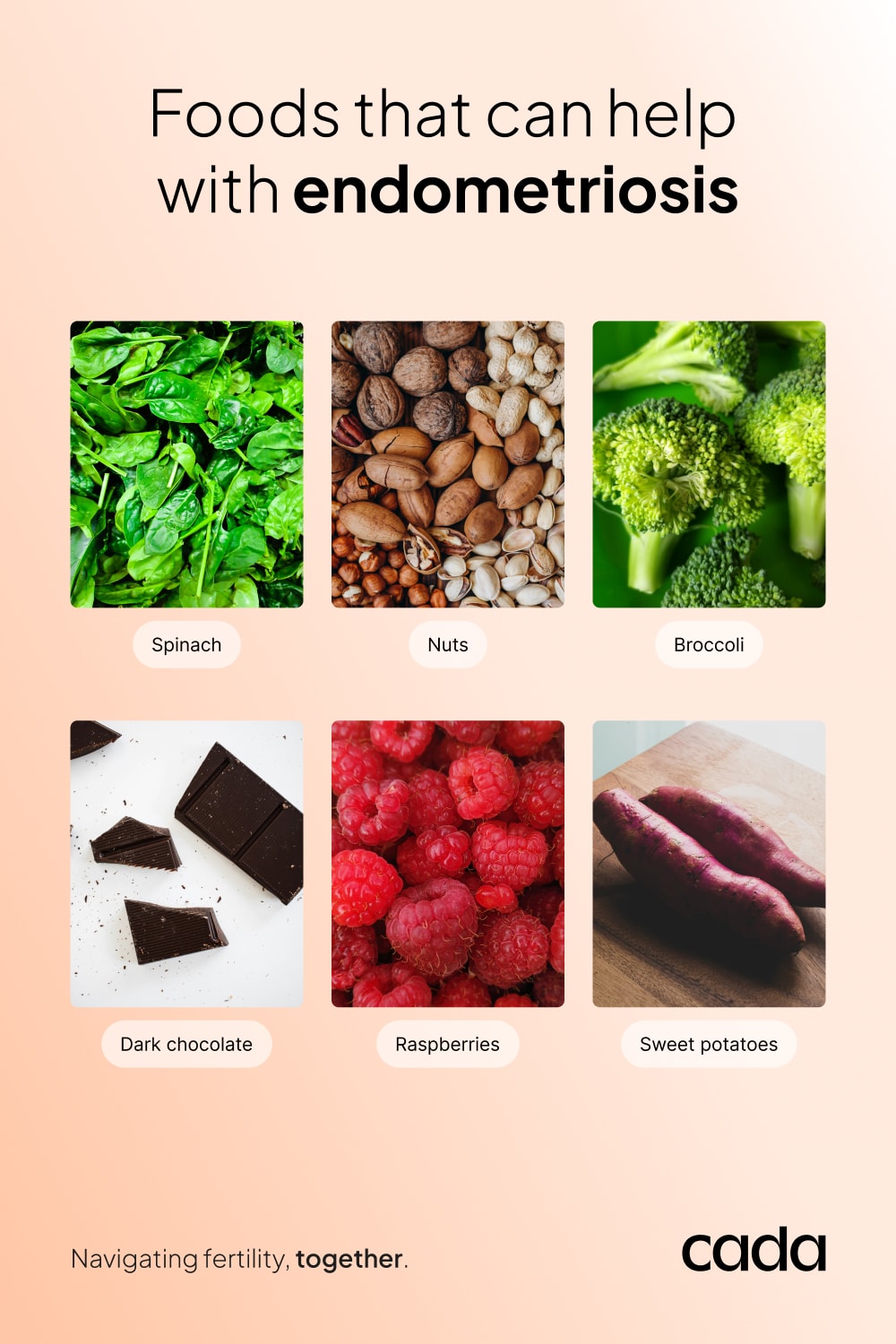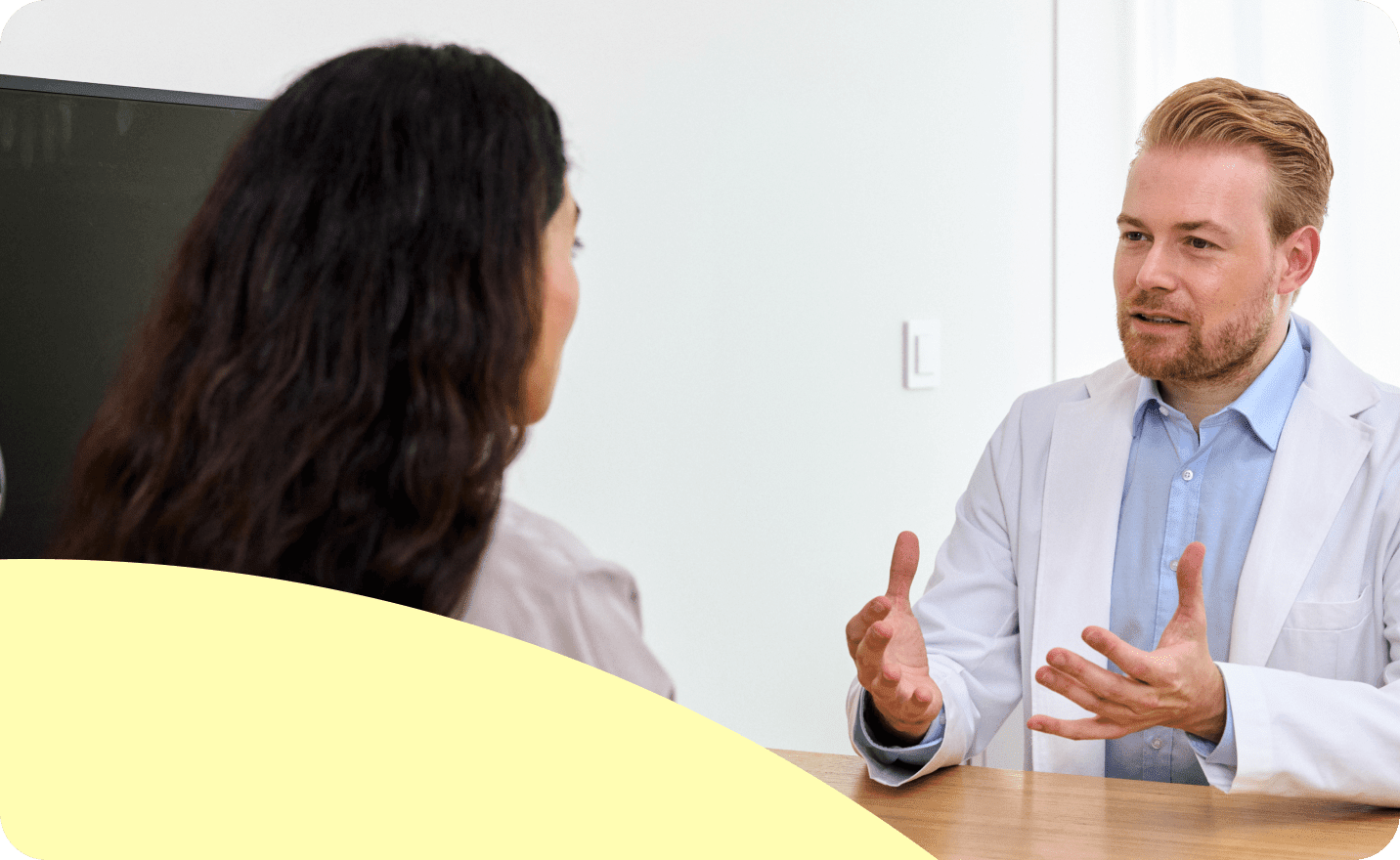Discover how dietary changes can help manage endometriosis symptoms. Learn which foods to eat and avoid for relief.
Key facts about nutrition for endometriosis:
- Approximately 10% of women of childbearing age suffer from endometriosis.
- Modifying your diet can help reduce inflammation and alleviate symptoms.
- Avoid alcohol, gluten, red meat, trans fats, and foods high in histamine.
- Include Omega-3 fatty acids, fiber, and iron-rich foods in your diet.
- Supplements such as zinc, vitamin E, vitamin D, and magnesium can have a positive effect.
Diet can significantly improve symptoms of endometriosis
As there is currently no cure for this condition, we aim to provide you with valuable information about nutrition for endometriosis in this article. We'll explore which foods and supplements can help manage endometriosis symptoms and which should be avoided.
Endometriosis is a chronic condition where benign tissue, similar to the uterine lining, grows outside the uterus. These growths can lead to severe pain, infertility, and other debilitating symptoms.
It's estimated that around 10% of women of childbearing age suffer from endometriosis. In Switzerland alone, approximately 190,000 women are affected by this condition.

Why is a healthy diet so important for endometriosis?
Nutrition alone cannot cure or treat endometriosis. However, changing your diet can help reduce inflammation and prevent the development of new endometriosis lesions.
Foods that can affect hormone levels, particularly oestrogen, may have a negative impact on endometriosis. Additionally, you should avoid foods that promote inflammation in the body, as they can lead to pain or progression of the condition.
Which foods should be avoided with endometriosis?
- Alcohol
- Gluten
- Red meat
- Saturated and trans fats
- Histamine
Certain lifestyle habits can influence the progression of endometriosis and increase the risk of developing the condition. These choices can also affect how painful or manageable the condition is.
Although further research is needed to link specific foods or habits to the development or worsening of the disease, the following foods may negatively affect endometriosis:

Alcohol
A review found that women who drank moderate amounts of alcohol had a significantly higher risk of endometriosis compared to those who didn't drink any alcohol. Drinking alcohol can worsen endometriosis symptoms because it increases inflammation and oxidative stress in the body.
Another reason may be alcohol's effect on oestrogen production, which is strongly linked to endometriosis. Excessive alcohol consumption can damage the liver, which then can't properly break down the oestrogen produced by the body.
Trans Fats
Trans fats are mainly found in fast food and processed foods. Studies have shown that women who consume more trans fats are more likely to be diagnosed with endometriosis.
One study showed that women with high trans fat intake (in the top fifth of the study group) had a 48% higher chance of developing endometriosis compared to women with low trans fat intake (in the bottom fifth). However, other studies have not found a significant link between trans fats and endometriosis risk.
Red Meat
Some research has shown that eating a lot of red meat and processed meats increases the risk of developing endometriosis. One study found that women who ate meat more than twice a day had a 56% higher risk of endometriosis compared to those who ate meat less than once a week. Red meat consumption can lead to higher oestrogen and oestrone sulfate levels, which can increase inflammation and contribute to endometriosis development.
Eating white meat, such as chicken, has also been linked to an increased risk of endometriosis.
Gluten
A study of 207 women with endometriosis found that 75% had less pain after eliminating gluten from their diets.
There is also some evidence that women with endometriosis may be more likely to have autoimmune diseases such as celiac disease or gluten sensitivity. It is thought that some women with endometriosis may have a shared genetic predisposition for both conditions. In addition, common immunological and inflammatory processes could play a role.
Histamine
Histamine is an important chemical messenger that regulates the sleep-wake cycle, among other things. Histamine is also involved in inflammatory processes, leading to tissue swelling and increased blood flow. Therefore, if you have endometriosis, you should eat a low-histamine diet as much as possible. This also applies if you have an intolerance to histamine (histamine intolerance).
Since a consistently low-histamine diet is very restrictive, it may make sense to avoid histamine-rich foods for a week before your period and during your period.
Foods that are particularly high in histamine and should be avoided during this time include:
- Processed foods
- Raw sausage varieties like salami
- Mature cheese
- Certain vegetables (e.g. tomatoes, avocado, sauerkraut, spinach)
- Tuna, seafood and shellfish
- Yeast
- Pasta, wheat products
- Alcohol
- Vinegar
- Coffee, black tea, cocoa
- Hot spices
What kind of diet helps with endometriosis?
To combat the inflammation and pain caused by endometriosis, it's best to eat a nutritious, balanced diet that is primarily plant-based and rich in vitamins and minerals. Fish and high-quality oils should also be included in your diet.
Here's an overview of foods that can positively impact your symptoms:
- Fiber-rich foods like fruits, vegetables, legumes, oatmeal, and whole grains.
- Iron-rich foods like dark leafy greens, broccoli, beans, and pumpkin seeds.
- Foods rich in omega-3 and omega-6 fatty acids like salmon, sardines, saltwater fish, flaxseed oil, and chia and flax seeds.
- Foods rich in antioxidants (like selenium) found in colorful fruits and vegetables, such as oranges, berries, spinach, and beetroot.
When it comes to nutrition, it can be helpful to consult a registered dietitian or nutritionist. Together, you can plan meals that are best suited for you and your endometriosis. In many cases, it helps to simply try things out, as diet and the tolerability of certain foods are very individual.

What dietary supplements can help with endometriosis?
In addition to a healthy diet, there are also some dietary supplements that can relieve the symptoms of endometriosis. These include:
Vitamin E
In a small study of 59 women with endometriosis, participants took 1,200 international units (IU) of vitamin E and 1,000 IU of vitamin C. The results showed a reduction in chronic pelvic pain and a decrease in inflammation.
Zinc
Another study involved supplementing with zinc and vitamins A, C, and E. Women with endometriosis who took these supplements had reduced peripheral markers of oxidative stress and improved antioxidant markers.
Magnesium
Magnesium can relieve cramps and reduce inflammation. It has also been found that women who consume a lot of magnesium have a reduced risk of endometriosis. In addition, magnesium has a positive effect on hormone regulation.
Curcumin
Curcumin, the anti-inflammatory active ingredient in turmeric root, may also help in the treatment of endometriosis. One study found that curcumin inhibits endometriosis cells by reducing estradiol production.
Vitamin D
A large prospective study showed that women with higher vitamin D levels and a higher proportion of dairy products in their diet were less likely to develop endometriosis. In addition to vitamin D, calcium and magnesium from food or supplements may also be beneficial.
Takeaway: The right diet can support endometriosis management
A well-balanced diet can help alleviate endometriosis symptoms and slow the growth of new endometrial tissue. An endometriosis-friendly diet should emphasise fresh vegetables, fruits, whole grains, and healthy fats. Additionally, certain supplements—such as vitamin E, zinc, magnesium, curcumin, and vitamin D—may provide symptom relief.
To support your well-being, it's best to avoid alcohol, gluten, red meat, trans fats, and high-histamine foods, especially in the days leading up to and during your period.
Since food tolerances vary from person to person, keeping a food diary or consulting a registered dietitian or nutritionist can help identify the best dietary choices for you. Experiment with different foods to find what works best for your body.







